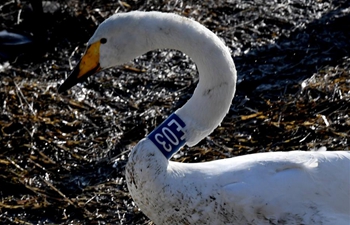SYDNEY, Nov. 29 (Xinhua) -- While the threat of climate change poses great risk to public health and the environment, universities in Australia have warned on Thursday that it could also cost the economy billions.
In an inaugural collaboration between the Medical Journal of Australia and the The Lancet, 19 experts from 13 of the nation's top universities and research institutes assessed 41 indicators across five key areas including climate change impacts, exposures and vulnerability; adaptation, planning and resilience for health; Mitigation actions and health co-benefits; Economics and finance; and Public and political engagement.
"Overall, we find that Australia is vulnerable to the impacts of climate change on health, and that policy inaction in this regard threatens Australian lives," co-leader of the research, Dr. Ying Zhang, from the University of Sydney's School of Public Health said.
"In a number of respects, Australia has gone backwards and now lags behind other high-income countries, such as Germany and the United Kingdom," the co-leader said.
"Examples include the persistence of a very high carbon-intensive energy system in Australia, and its slow transition to renewables and low carbon electricity generation," the co-leader added.
With the publication to be updated every year, the nation's leading climate researchers hope to track what effect of rising temperatures are having on all levels of Australian society.
"Given the overall poor state of progress on climate change and health in Australia, this country now has an enormous opportunity to take action and protect human health and lives," the publication said.
"In Australia, hot days have a damaging effect on whole-population mental health equivalent to that of unemployment and can predict hospitalisation for self-harm. While this association is reversed in cooler locations, where elevated suicide rates are predicted by cooler maximum temperatures... Adaptation planning for unusually hot or cold weather could usefully consider the interaction between suicide, gender, jurisdiction and local climate, with the aim of weakening temperature-suicide associations," according to the publication.
The publication also outlined that climate change is likely to impact Australia's economy.
"From a health perspective, taking action to curb emissions will accrue numerous population-level benefits, such as reductions in cardiovascular and respiratory disease rates, with associated healthcare cost savings," Professor Tony Capon of Planetary Health from the University of Sydney said.
"Further, proactive measures to increase the resilience and adaptive capabilities of Australian health systems and local communities are likely to generate long-term economic savings, partly due to their positive impact on mental health," the professor said.













